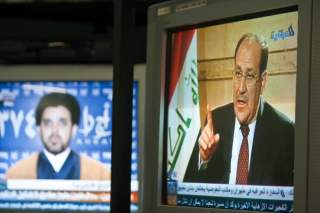The Myth of Iraqi Reconciliation
If America determines that military action is warranted, then it should take this action without regard to what Maliki does or does not do politically.
Reports that the United States is contemplating military assistance to Iraqi Prime Minister Maliki’s regime on the condition that it accept an inclusive government—that is, bring in more Sunnis—miss the point on several levels. If the United States determines that some U.S. military action (such as air strikes) is indeed warranted to prevent an ISIL (the Islamic State in Iraq and the Levant) victory in Iraq, then it should take this action without regard to what Maliki does or does not do on the political front. Sectarian divisions in Iraq are too far advanced for inclusivity to be viable.
There are many reasons for dropping insistence on inclusivity. First, on a practical level, that ship has already sailed. For many years, U.S. officials have implored Maliki to undertake this very task and have always come up short. Maliki has cleverly fashioned himself as an Iraqi nationalist in recent years, but deep down inside, he has remained the same person who worked for the secretive Shia Dawa party for most of his career (much of it in exile in Syria and Iran before returning to Iraq after the U.S.-led invasion in 2003). A zebra cannot change its stripes, as they say. Maliki gave lip service to inclusivity, but was never serious about carrying it out. He may do so again in order to garner U.S. military support, but that does not mean that he will be any more serious this time around, especially when the ISIL hordes are at Baghdad’s gate.
Second, press reports indicate that many Iraqi Sunni tribal leaders have facilitated the advance of the ISIL terrorists. Indeed, the rapid advance of ISIL, which has at most only 10,000 fighters, could not have been accomplished without at least the tacit support of such leaders. The Sunni tribes have apparently concluded that a pact with ISIL is preferable to trying to work with Maliki to win gains for the Sunni community. These same press reports suggest that the tribal leaders believe they can tame and eventually control ISIL, a long shot to be sure, given the desire of ISIL to install a very strict and intolerant regime in areas now under its jurisdiction. This tacit alliance between the Iraqi Sunni tribes and ISIL underscores the depth of Iraqi Sunni hatred toward Maliki and his Shia-dominated government. Hence, even if the United States were to somehow succeed in compelling Maliki to reach out to the Sunnis, the prime minister would find few takers, given this high level of animosity.
Third, the Kurds seem to have concluded that the Arab portions of Iraq—that is, most of the country—are hopelessly engaged in an internecine sectarian war between Arab Sunnis and Shia, and they want no part of that struggle. They used the recent chaos to take Kirkuk, sometimes called the Kurds’ Jerusalem, a city with a mixed Kurdish-Arab population that was just outside of the Kurds’ ministate in northern Iraq. The future of Kirkuk was to be decided by a referendum in 2007, but this issue was delayed many times, because it was so explosive. In one fell swoop, the Kurds ended the Kirkuk controversy by incorporating it into their ministate by force of arms. Now, with their territorial demands met and their own economy in good shape largely because of oil resources within their territory—not to mention having a strong military force of their own, the capable and well-trained Peshmerga—the Kurds are probably more than happy to leave the Arab portion of Iraq to its own devices. Hence, they have no real desire to reenter Iraqi politics in any meaningful way. They distrust the Arab Sunnis, whom they see as their longtime oppressors (predating even Saddam Hussein), and came to dislike Maliki and his Shia-dominated government over disputes regarding oil resources and revenues.
Fourth, the Iraqi army, despite the billions of dollars spent by the United States to train and equip it as a multisectarian and nonpartisan force, has proven to be inept and unreliable. Its performance in Mosul when soldiers fled by the thousands against a numerically inferior ISIL force shows that it cannot stand up to threats and become a national, unifying force. Maliki himself has recognized this disaster and has now turned to the Shia militias and units of the Iraqi army that are exclusively Shia to fight against ISIL. This reliance on a sectarian force may eventually save the day for Maliki and prevent ISIL from taking Baghdad and the Shia south. Maliki may also be saved by Iranian assistance and U.S. air power. However, such actions will do little to bring about reconciliation, and any U.S. insistence that Maliki open up to the Sunnis is unrealistic.
The one hope in the Iraq imbroglio is that the Sunni tribes of western and central Iraq might turn against ISIL as they tire of ISIL rule and resent its strict application of Sharia law. There could be a new “Awakening” in the Sunni provinces, similar to what that took place several years ago when the Sunnis turned against Al Qaeda in Iraq, the predecessor of ISIL. However, this development, if it were to take place, would probably take even longer than it did the first time around because ISIL has become shrewder than its predecessor. And even if the Sunnis eventually turn against ISIL, this does not necessarily mean that reconciliation with the Shia will happen. The reconciliation bus has already left the station. Iraq might not be physically divided on the map, but in reality, it is comprised of three separate states with their own agendas.
Gregory Aftandilian is a Senior Fellow for the Middle East at the Center for National Policy. The views expressed are his own.
Image: Flickr/Al Jazeera English/CC by-sa 2.0

